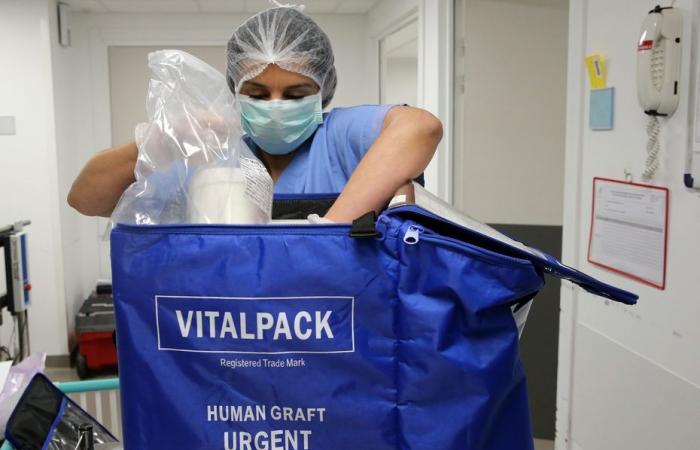
On the occasion of World Organ and Tissue Donation Day, Thursday October 17, let’s take a look at the evolution of this practice. In 2023, the rate of opposition to organ and tissue donation has increased in France. For what ?
Company
From daily life to major issues, discover the subjects that make up local society, such as justice, education, health and family.
France Télévisions uses your email address to send you the “Society” newsletter. You can unsubscribe at any time via the link at the bottom of this newsletter. Our privacy policy
In 2023, the rate of opposition to organ and tissue donation was 36.1% for patients who died in France of brain deaths. A figure up compared to previous years since the opposition rate was 33% in 2022 and 30% in 2018. For Florine, nurse in charge of coordinating organ and tissue harvesting at Besançon University Hospital in the Doubs, the explanations are multifactorial.
“In an opinion survey, [publié en janvier 2024 par l’Agence de biomédecine]80% of people questioned say they are in favor of the donation, so we should have an opposition rate of 20%. underlines the caregiver. Problem: the survey reveals many false beliefs surrounding organ and tissue donation.
READ ALSO: Véronique breathes with someone else’s lungs, “every day, I think of my donor”
Alone “24% of French people know that donated organs are not used for science, but only to save lives”, notes Florine. There would therefore be confusion between organ and tissue donations and the donation of one’s body to science.
“Some also believe that the person is not dead when they see their loved one in intensive care with artificial ventilation. They do not look like someone who has died so it can be difficult to understand,” explains the nurse. “It’s up to us to support them,” she adds.
Other factors may also come into play, such as attachment to religious and traditional values. “Many think that if there are organ donations, they will not be able to carry out their funeral rites as usual.” However, organ and tissue removal does not delay the funeral and the surgery is carried out with as much precaution and care as on a living person.
The body is respected. We guarantee that when the deceased is at the funeral home, we do not see that organ or tissue donations have been taken. He has the same appearance as any deceased person.
Florine, nurse coordinating organ and tissue harvesting at Besançon hospital
For Florine, distrust of the health system and denial of death also play a role in refusals.
When death occurs due to brain death, caregivers seek to know the wishes of the deceased person. In France, the principle of “presumed consent” applies: everyone is considered an organ donor unless, during their lifetime, the person has registered on the National Registry of Refusals.
“When the death is declared by the doctors, we are obliged to consult the national register of refusals to see if the person has registered in these registers. If this is the case, we will not continue the procedure of Don”, explains the nurse.
If the deceased person is not registered on this register, caregivers will turn to relatives to testify about the position of the potential donor. The latter may in particular have opposed organ and tissue donations by leaving a writing to his loved ones or by speaking to them about his opposition. “We can be selective in what we want to give or not, it’s not all or nothing,” adds Florine.
At the time of death, caregivers seek to know the wishes of the deceased person.
•
© LIONEL VADAM / MAXPPP
“We look for relatives to tell us about the position of the deceased person. Afterwards, people often don’t talk about it”. From the moment relatives are informed, they have a few hours to make known the location of the deceased.
It is not their opinion that we are looking for, but what the potential donor would have wanted.
Florine, nurse coordinating organ and tissue harvesting at Besançon hospital
The job of organ donation services is therefore also to inform the general public to encourage people to communicate with each other about organ donation. “We intervene in schools and at the level of companies that request it or during events such as national organ donation day”, she specifies.
For these caregivers, it is a question of reducing the refusal rate. In 2023, 5,634 organ transplants were carried out for 11,422 people who were on the waiting list, according to the Biomedicine Agency. A rate increase of 2.5% compared to 2022. Despite everything, “due to a lack of grafts, there are still people waiting who die”, informs the caregiver. In 2023, 823 people lost their lives due to lack of a transplant.
For the year 2023, the Besançon University Hospital carried out 316 samples: 201 corneas, 36 kidneys, 37 times, 14 hearts, six pairs of lungs, eight pancreases, five epidermis samples and nine arteries.
For more information, you can contact the organ and tissue collection coordination service at Besançon hospital by email at the email address: [email protected]





